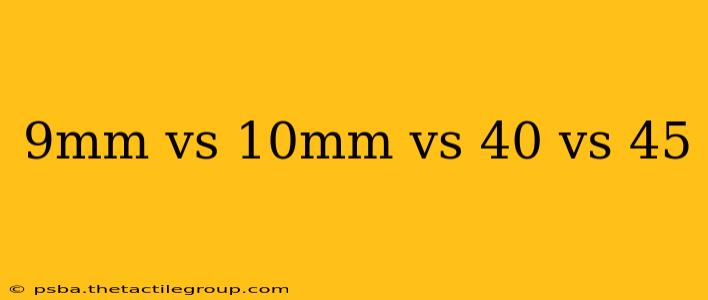Choosing the right caliber for self-defense or concealed carry is a crucial decision, impacting both effectiveness and personal comfort. This in-depth comparison of 9mm, .40 S&W, .45 ACP, and 10mm Auto will help you understand the strengths and weaknesses of each, allowing for a more informed choice. We'll examine factors like stopping power, recoil, capacity, and suitability for various applications.
Stopping Power: The Impact of Caliber
Stopping power is a complex topic often debated among firearms enthusiasts. While there's no single definitive answer, we can analyze factors contributing to a round's effectiveness:
-
Caliber: Larger calibers generally deliver more energy, leading to greater tissue damage. The .45 ACP and 10mm Auto are typically considered to have higher stopping power than the 9mm and .40 S&W due to their larger bullet diameter and greater mass.
-
Bullet Construction: The bullet's design (e.g., hollow point, full metal jacket) significantly impacts its expansion and penetration. Hollow points are designed to expand upon impact, increasing their stopping power but potentially reducing penetration. Full metal jackets penetrate more deeply but cause less tissue damage.
-
Velocity: A higher velocity round delivers more energy, further contributing to stopping power. The 10mm, for instance, often boasts higher velocities than the .45 ACP.
In Summary: The .45 ACP and 10mm generally offer more stopping power on paper, but modern 9mm and .40 S&W ammunition, especially with high-quality hollow points, has significantly narrowed this gap. Shot placement remains paramount, regardless of caliber.
Recoil and Shootability: The Human Factor
Recoil is the backward force experienced when a firearm is fired. This is a critical factor, particularly for concealed carry where quick follow-up shots are essential:
-
9mm: Generally considered to have the lowest recoil of the four calibers, making it easier to control and achieve rapid follow-up shots. This is a significant advantage for less experienced shooters.
-
.40 S&W: More recoil than the 9mm but less than the .45 ACP and 10mm. It represents a compromise between stopping power and shootability.
-
.45 ACP: Notable recoil, particularly for smaller-framed individuals. This can impact accuracy and the ability to quickly fire multiple shots.
-
10mm Auto: Often considered to have the highest recoil among these four, demanding significant practice to master.
Magazine Capacity: Rounds on Target
Magazine capacity impacts how many rounds you can fire before reloading.
-
9mm: Typically offers the highest magazine capacity due to its smaller size and weight.
-
.40 S&W: Lower capacity than the 9mm.
-
.45 ACP: The lowest capacity among the four.
-
10mm Auto: Capacity varies depending on the firearm, often falling between the .40 S&W and 9mm.
Concealed Carry Considerations: Size and Weight
Concealed carry requires a balance between stopping power and concealability. Smaller, lighter handguns are generally preferred for concealed carry, while larger guns may be more comfortable for range shooting or home defense. The 9mm often has a clear advantage here due to smaller, lighter firearms.
Which Caliber is Right for You?
The "best" caliber is subjective and depends on individual needs and preferences:
-
9mm: Excellent choice for concealed carry, offering a balance of stopping power, recoil, capacity, and ease of use.
-
.40 S&W: A good compromise between stopping power and recoil, suitable for self-defense and law enforcement.
-
.45 ACP: Provides significant stopping power, but its stronger recoil may be challenging for some shooters. Better suited for home defense or situations where quick follow-up shots are less critical.
-
10mm Auto: High stopping power, but with significant recoil, making it more suitable for experienced shooters and those prioritizing maximum stopping power above all else.
This comparison provides a framework for your decision. Remember to handle and shoot different firearms in each caliber to determine which one best suits your individual needs and capabilities. Consult with experienced firearms instructors and consider professional training before making your final decision. Safety should always be your top priority.

